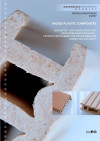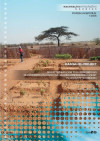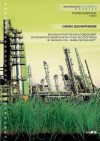Suchergebnisse für "Factsheet: Energietechnologien gestalten, die für alle sinnvoll und nutzbar sind"
Holzverbundwerkstoffe

Zukunftfähige Werkstoffe aus Holzverbundmaterialien - Projekte im Rahmen der Programmlinie "Fabrik der Zukunft"
Forschungsforum
2/2007
Herausgeber: BMVIT
Deutsch, 6 Seiten
Downloads zur Publikation
Grüne Bioraffinerie - Gewinnung von Milchsäure aus Grassilagesaft
Erforschung eines technischen Verfahrens zur Milchsäuregewinnung aus Grassilagen. Milchsäure, eine vielversprechende ökologische Basischemikalie, wird aus fermentierter Grünmasse kostengünstig gewonnen, um zu hochwertigen Produkten weiterverarbeitet werden zu können.
Das Sahel-Projekt

Silikattechnologie zur Verbesserung der Wasseraufnahme und Nährstoffspeicherfähigkeit in Grenzertragsböden
Forschungsforum
1/2006
Herausgeber: BMVIT
Deutsch, 6 Seiten
Downloads zur Publikation
De-lacquering as a service
Development of the service of de-lacquering in industrial plants on the basis of pulsed high pressure water with a new, energy efficient high pressure pump. Further possible applications will be searched for and evaluated.
Holzbearbeitung mit Überlagerung einer Ultraschall-Wechselbeanspruchung
Entwicklung von Verfahren zur Holzbearbeitung unterstützt durch hochfrequente Ultraschallvibration in Hinsicht auf Anwendungen in der holzverarbeitenden Industrie.
Solar thermal cooling system consisting of a parabolic trough collector field and a steam jet ejector chiller
A solar thermal cooling system consisting of a parabolic trough collector field and a steam jet ejector chiller has been developed. The necessary components were built and tested and finally put together to get an operating pilot plant at the test facility.
RAINBOW 2
Überführung der in Rainbow 1 erarbeiteten Kenntnisse zur Entwicklung funktionalisierter Fasern aus nachwachsenden Rohstoffen in einen halbtechnischen Maßstab sowie auf verschiedene Faserherstellungsverfahren.
Waste heat utilisation and use of renewable energy sources in a metal-working enterprise
Use of waste heat and covering of the remaining energy demand by the renewable energy sources hydropower and biomass in a metal-processing company.
Ecologically friendly resin impregnation of rotating machines with the use of the joule effect
Windings of rotating machines or electrical generators (e. g. wind and water power generators) are impregnated with resin. A new technology using the heating effect of current is investigated. The high efficiency of heating with the joule effect results in quick heating of stator leading to fast gelling of the resin, which implies low emission.
Development of a continuous hydrogen-carbon nanofibers production line
With the development of a hydrogen-carbon nanofiber production in a continuous process carbon nanofibers can be produced in an economic way and at the same time access to environmentally friendly hydrogen is enabled.
Raising efficiency by an optimized filters purification system using waste heat in metal industry
Purification and disposal of production effluents in waste water from metal manu¬fakturing processes is of economical and ecological importance for the Joh. Pengg AG. Econamical solutions for optimised purification of the filter textiles and the drying of the filter cake with waste heat have been found.
Wood Plastic Composites - Direktextrusion
Entwicklung einer Holzspänedirektdosierung
Stoffliche Verwertung der textilen Restfraktion
Verwertung des im Zuge der Aussortierung von brauchbarer Second-hand Bekleidung aus gesammelter Altkleidung anfallende textile Abfall soll einer Wiederverwendung zugeführt werden; Entwicklung von automatisierten, mechanischen Verfahren zu Aufbereitung; Vermeidung von Abfall.
Development of miniaturized, ceramic high-temperature fuel-cell-components using resources-perserving mass-production processes
The application of nano scaled powder and powder injection moulding (PIM) for energy efficient co-sintering of miniaturized solid oxid fuel cells which can produce current and heat by using renewable raw materials.
Phytozid - Application of tansy extract and its ingredients as insecticides against the codling moth
Extraction of insecticidal active substances in pilot plant scale from tansy for field trials against the economically important pest codling moth (Cydia pomonella) as well as approval procedure in order to develop alternative strategies for naturally based plant protection.
Implementation of a cascaded use of stone-fruit residual-mass - Practice-oriented planning for installing a pilot plant for manufacturing marketable products
NAWARO-CASCADING PILOT has investigated professional biocascading strategies for fruit stone utilization (pits from apricots, peaches, cherries and plums) in order to convert them valuable products (novelties like delicacies, cosmetics and technical abrasives) as well as establishing a practice- oriented network.
Grüne Bioraffinerie

Ein innovatives Technologiekonzept zur Schaffung einer nachhaltigen Rohstoffbasis im Rahmen von "Fabrik der Zukunft"
Forschungsforum
1/2004
Herausgeber: BMVIT
Deutsch, 6 Seiten
Downloads zur Publikation
Natural Dyes for the Textile Industry
New cooperations between agriculture und industry are necessary to ensure the utilization of renewable materials. The project´s focus is upon natural dyes and their application in textile industry. The goal of the project is to create a contact institution which connects various suppliers of diverse plant materials, takes on the processing, and standardising of the natural dyes, and makes a product that can be used by the industry.
Characterisation of material parameters as basis for innovative processing methods and products made of large dimensioned wood aiming at economically sustainable use of Austrian timber resources "XXL-Wood"
Facing the problem of decreasing demand for large dimensioned timber, investigations are carried out concerning certain properties like strength and fibre characteristics. Due to the data it is possible to create a model about the variability of special properties of a stem. Based on the model new concepts for optimised processing and products will be developed.
The Paper Factory in the Year 2030
Paper factory in the year 2030 as an integrated part of a sustainable economy and a supplier of sustainable paper products fulfilling criteria for sustainability at highest possible level.
